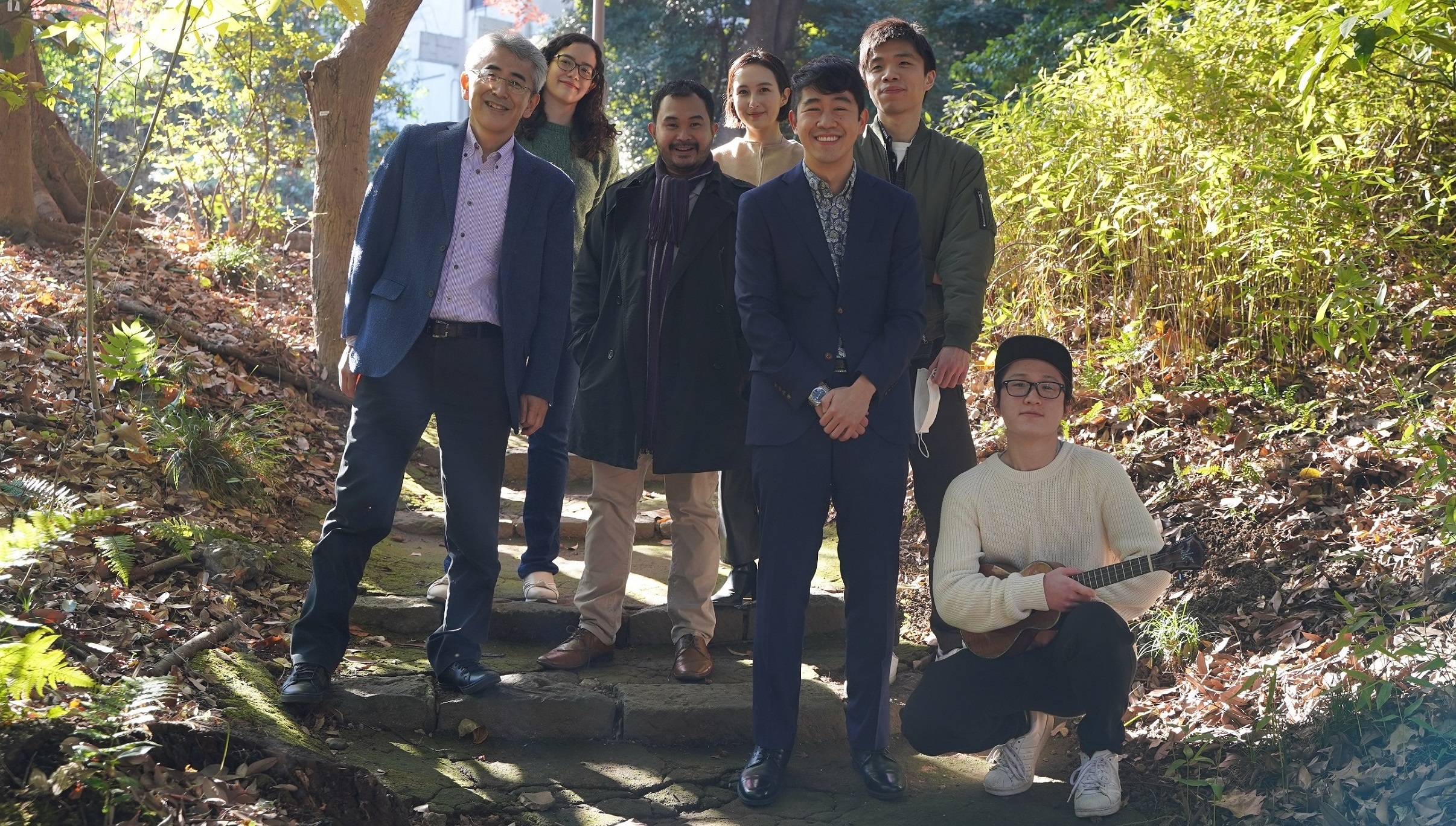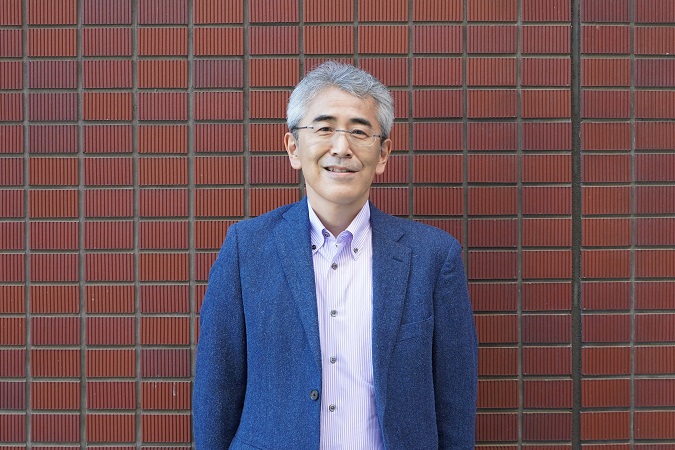International outlook creates a more diverse, global campus | Diversity and UTokyo 05 | Professor Yujin Yaguchi

This series looks into diversity-related issues and initiatives at UTokyo, through interviews with faculty members. The university strives to create a place where people with diverse backgrounds can thrive.

Professor Yujin Yaguchi (far left) and his students, who come from countries around the world, including Brazil, the U.S., the Philippines, the U.K. and China as well as Japan, gather by Sanshiro Pond on the Hongo Campus in late December, 2021. As classes had gone online due to the pandemic, many met in person for the first time.
Professor Yujin Yaguchi of the Graduate School of Interdisciplinary Information Studies has long been engaged with internationalizing the education of the University of Tokyo. The cultural studies scholar was involved in launching the university’s first English-language undergraduate degree program called Programs in English at Komaba (PEAK) in 2012, as well as starting a short-term academic program for non-UTokyo overseas students taught in English called UTokyo Global Unit Courses (UTokyo GUC) in 2021.
In recent years, the number of international students has been on the rise at the University of Tokyo. However, on the whole, the university mostly attracts male Japanese students coming from a similar educational background, creating a significant imbalance in terms of gender and nationalities. Yaguchi, who initially went to the U.S. as an undergraduate student and completed his doctoral degree there, stressed that internationalization is crucial for creating a more diverse and better campus.
The importance of studying with international students
As of November 2021, a total of 4,623 international students were enrolled in UTokyo, an increase of more than 1,500 from a decade earlier. But the overwhelming majority of them are graduate students. There are only 345 international undergraduate students, accounting for just 2.5% of the total. One of the reasons for this low figure is because most undergraduate classes are taught in Japanese. The proportion of international undergraduate students would be higher if it included short-term exchange students, but the number is not high enough, Yaguchi noted.
Most of the international students studying at the University of Tokyo hail from China, thanks to the growing global mobility of talented students from that country, but the number of students from other countries hasn’t risen in recent years. “We must communicate the significance of studying at UTokyo and in Japan to the world,” said Yaguchi, who serves as deputy director general of the Division for Global Campus Initiatives and has been director of its International Education Support Office since 2018.
Yaguchi believes that studying with people of different values and backgrounds is important for a successful career in a globalized society. “You need to be able to articulate your ideas to people of different values while also listening to the voices of others and work together to generate new ideas,” he said.
To achieve that, he remarked: “I want to see those students who were born and raised in Japan to gain experiences in different places. I also want to welcome more international students to our campus and have them share their values and ideas with us so that we may create a truly diverse university.”
Impact of the pandemic

The coronavirus pandemic has also greatly affected international students, many of whom have been unable to enter Japan due to the country’s immigration restrictions. As of January 2022, over 1,000 international students enrolled in UTokyo remained overseas.
“International students are not tourists. They are important and integral members of our university community,” Yaguchi said. “I want to see them back on campus as soon as possible. I am concerned that if these highly restrictive entry measures continue for a long time, international students may not come back to Japan even when the government eases them.”
Meanwhile, those international students who are already in Japan face difficulties as well. With most of their classes being conducted online, they haven’t been coming to campus much. And some may feel cut off from society without having a community to which they can physically belong. Many students refrain from going back to their country during holidays or for family affairs because they worry Japan’s entry policy may suddenly change.
“It must be lonely for those students who are here on their own,” Yaguchi said. “We should not forget about such students and try to respond to their needs.”
The pandemic has also had an impact on the number of outbound students. Yaguchi explained that the students studying abroad were increasing gradually until the pandemic hit, thanks to various opportunities offered by the university, including short-term study abroad programs. But the number has dropped significantly. “It will be a challenge to figure out ways to increase the number again,” he said.
Creating a global campus
In a bid to further accelerate internationalization under the leadership of President Teruo Fujii, UTokyo is preparing to establish a new organization for global education in 2023. “We are planning to create a more robust basis for global education for all the students,” Yaguchi said, explaining that they are planning to beef up existing measures and programs.
Such efforts will include the expansion of Go Global Gateway, a global competence certificate launched in 2018, which aims to nurture a global mindset of undergraduate students and the development of more short-term overseas programs to make the study abroad experience more accessible to many students. The university also plans to increase the number of courses offered in English while working to meet the demands for Japanese language courses for international students. Additionally, UTokyo GUC, the short-term intensive academic program for overseas students, will be offering more courses during the summer.
Yaguchi said, ideally, he would like to see a campus where study-abroad is no longer regarded as an unusual experience. “When you go onto a world stage, ‘I am a student of the University of Tokyo’ does not really mean much. It’s important to put yourself in an environment where you meet people of diverse backgrounds, including gender and sexual orientation, religion, race, place of origin and others, and try to explain yourself while also listening to others. This is often an unsettling and even unpleasant experience, but it doesn’t compare with the ultimate joy and reward of intercultural understanding and friendship.”
The push for diversity, which is essential for making a better school and society, cannot be achieved without internationalizing the university, Yaguchi said. “I would like to contribute to making a better environment for research and education by creating a more global and diverse campus.”






